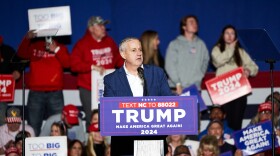North Carolina Democratic U.S. Senate candidate Cheri Beasley saw her fundraising advantage over Republican rival Ted Budd widen during the past three months and entering the campaign's final weeks.
Budd's campaign reported over the weekend — on the Federal Election Commission's deadline date — that it raised $4.77 million during the three months ending Sept. 30. That's barely one-third the $13.36 million that Beasley told the FEC that she raised — in keeping with what her campaign already had disclosed last week.
Beasley has been the top fundraiser among all of the candidates that sought to succeed retiring Republican Sen. Richard Burr since she entered the race 18 months ago. Her campaign also outspent Budd during the quarter by a 4-1 margin.
“Cheri has earned unmatched support in every quarter of this race because North Carolinians know she is the only candidate who will stand up for the people of North Carolina and put them first — every day, every time,” Beasley campaign manager Travis Brimm said in a news release.
For the entire election cycle, Beasley has raised $29.4 million compared to $11.1 million for Budd.
Budd’s campaign downplayed Beasley’s margin, pointing out that Democratic Senate nominees in North Carolina since 2014 — all unsuccessful — outraised their Republican rivals in the third quarter.
“The numbers that matter to the working families of North Carolina are the skyrocketing cost of living due to inflation and the rising violent crime rates,” Budd said. The three-term congressman blames those things on President Joe Biden’s policies, which he says are supported by Beasley, a former chief justice of the state Supreme Court.
Budd’s monetary deficit has largely been closed by national Republican groups and other super PAC allies that are spending large sums on money opposing Beasley.
The Senate Leadership Fund — which backs Republican Senate candidates and is linked to Minority Leader Mitch McConnell, R-Ky. — has now spent $24.7 million on advertising against Beasley, according to FEC reports. Another $6.5 million has spent by the National Republican Senatorial Committee opposing her.
On the Democratic side, the Senate Majority PAC — associated with Majority Leader Chuck Schumer, D-N.Y., said it has spent over $10.5 million against Budd or for Beasley. The group said late last week it had reserved another $4 million in TV advertising in the campaign's final two weeks.
PACs associated with the National Federation of Independent Business — backing Budd — and the Human Rights Campaign — supporting Beasley — unveiled ad campaigns Monday to attempt to influence the election, which could decide which party takes a majority in the current 50-50 Senate.
Both candidates are appearing with current senators to help them rally supporters and encourage voting in the campaign's final weeks.
Over the weekend, Sens. Cory Booker, D-N.J., and Jon Ossoff, D-Ga., appeared with Beasley at separate get-out-the-vote rallies — Booker in Charlotte and Ossoff in Chapel Hill.
And Budd was scheduled to appear Monday with Sen. Lindsey Graham, R-S.C., for a national security panel in Charlotte with other speakers, including former Director of National Intelligence John Ratcliffe. U.S. Sen. John Kennedy, R-La., campaigned for Budd in Concord last week.





